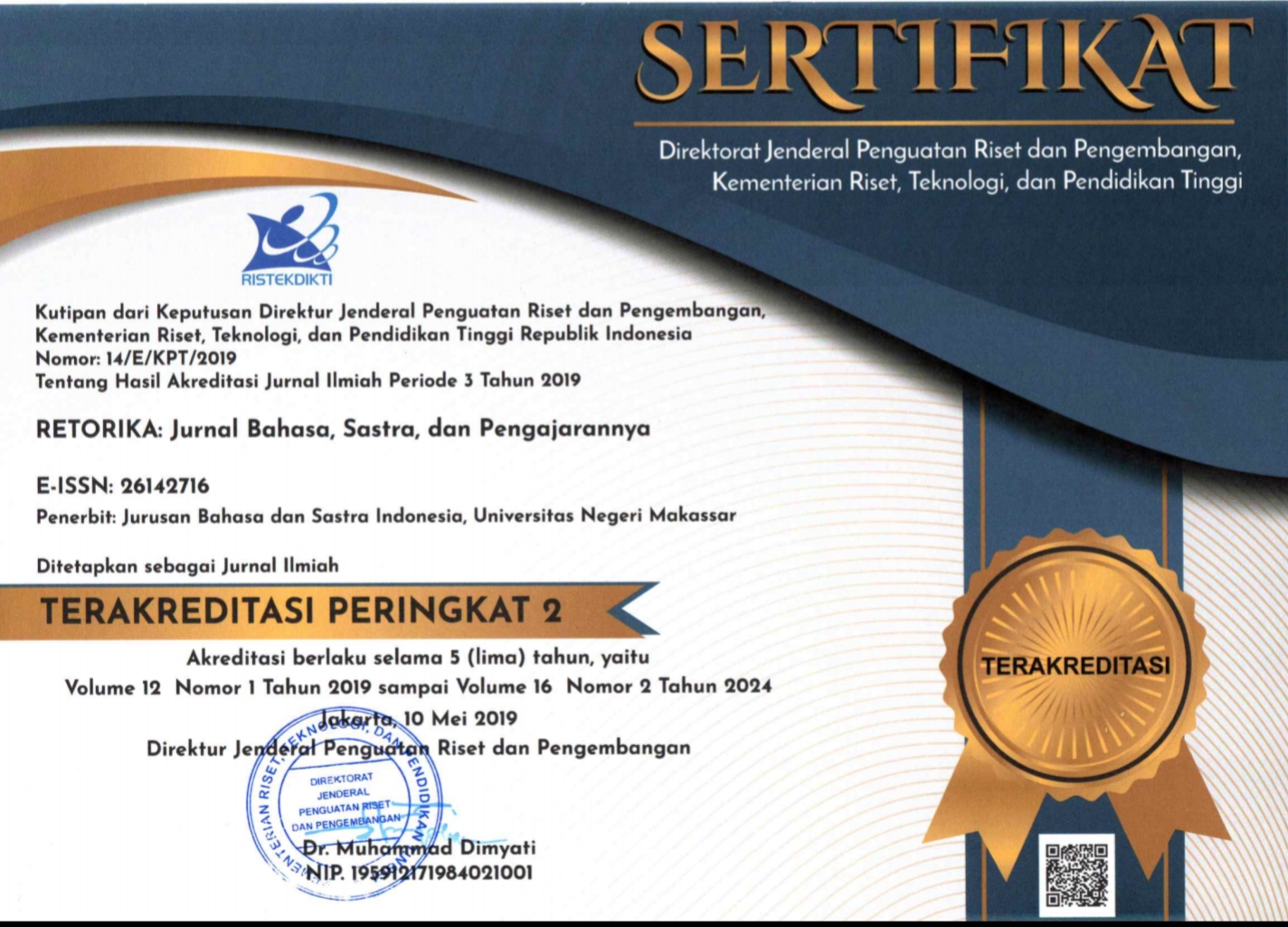THE USE OF SPEECH ACTS IN ANGNGARU OF MAKASSAR SOCIETY
(1) English Department Universitas Negeri Makassar
(*) Corresponding Author
DOI: https://doi.org/10.26858/retorika.v12i2.9099
Abstract
Keywords
Full Text:
PDFReferences
Al-Shboul, Y. & Maros, M. 2013. Condolences strategies by Jordanians to an obituary status update on facebook. GEMA Online Journal of Language Studies, 13(3), 151-162.
Amarien, N. 2010. Interlanguage pragmatics: A study of the refusal strategies of Indonesian speakers speaking English. TEFLIN Journal, 8(1), 1-12.
Austin, J. L. 1962. How to do things with words. Oxford: Clarendon Press.
Batch, K. & Harnish, R.M. 1979. Linguistic communication and speech Acts. USA: The Massachussets Institute of Technology (MIT) Press.
Bonvillain, N. 1993. Language, culture, and com-munication: The meaning of messages. Engle-wood Cliffs: Prentice Hall.
Boxer, D. 1993. Social distance and speech behavior: The case of indirect complaints. Journal of Pragmatics, 19(2), 103-125.
Chabot, H. T. 1996. Kinship, status, and gender in South Celebes. Leiden: KITLV Press.
Chang, S.-Y., & Liu, Y. 2016. From problem-orien-tedness to goal-orientedness: reconceptuali-zing communication strategies as forms of intra-mental and inter-mental mediation. System, 61, 43-54.
Duranti, A. 1997. Linguistic anthropology. New York: Cambridge University Press.
Graham, S. 2001. Negotiating gender: Calalai' in Bugis society. Murdoch University. http:// sshe.murdoch.edu.au/intersections/issue6/graham.html, Accessed 11 March 2004.
Gunawan, A. 2013. Aru (Angngaru) sumpah setia para Tubarani (The Loyal Promise of the Brave People). http://gowa-negeri1001cerita. blogspot.com/2013. Accessed 26 July 2014.
Iswary, E. 2009. Pengajaran etika berbasis kearifan lokal Makassar di era globalisasi (The teaching of ethics based on local Makassar belief in the global era). Proceeding of the First International Conference on Language Education (ICOLE). Makassar: Language Center, the State University of Makassar (pp. 99-106).
Khairuddin, F. 2011. Aru Tubarani, Sumpahnya Kerajaan Gowa sebelum pergi perang (The Promise of Gowa Kingdom before War).
http://m. kompasiana.com/post/read/368973/3/html. Accessed on 26 July 2014.
Kramsch, C. 1998. Language and culture. New York: Oxford University Press.
Krishnan, I. A., Ramalingam, S. J., Ching, S. H., & Maruthai, E. 2018. The functions of communi-cation strategies: an analysis of Chinese EFL learners' transactional practice. Journal of Language and Communication, 5(2), 151-159.
Levinson, S. C. 1983. Pragmatics. Cambridge: Cambridge University Press.
Limpo, S. Y. L, Culla, A. S., & Tika, Z. 1995. Profil sejarah budaya dan pemerintah Gowa (The Profiles of Culture and History of Gowa). Sungguminasa: Intisari.
Mahmud, M. 2017. Communicative styles of English students at the State University of Makassar. GEMA Online Journal of Language Studies, 17(1), 223-238.
Mestrie, R. 2000. Clearing the ground: Basic issues, concepts, and approaches. In Rajend Mesthrie, Joan Swam, Andrea Deumert, and William L. Leap (eds.). Introducing Sociolinguistics. Edinburg: Edinburg University Press.
Mey, J. L. 1993. Pragmatics: An Introduction. UK: Blackwell.
Milal, A.D. 2011. Indicators of the practice of power in language classrooms. The TEFLIN Journal, 22(1), 1-15.
Pawlak, M. 2015. Advanced learners’ use of communication strategies in spontaneous language performance. In M. Pawlak & E. Waniek-Klimczak (Eds.), Issues in teaching, learning, and testing speaking in a second language, second language learning, and teaching. Second language learning and teaching (pp. 121-141). Heidelberg, Berlin: Springer.
Pelras, C. 1996. The Bugis. Cambridge, Massachus-sets: Blackwell Publishers.
Sari, A. P. 2010. Female EFL learners’ request rea-lization in relation to their ethnic backgrounds. TEFLIN Journal, 21(1), 41-56.
Sattar, H. Q. A., Lah, S. C., & Suleiman, R.R.R. 2011. Refusal strategies in English by Malay university students. GEMA Online Journal of Language Studies, 11(3), 69-81.
Saville-Troike, M. 1982. The Ethnography of com-munication: An Introduction. Oxford: Basil Blackwell.
Searle, J. 1969. Speech acts. Cambridge: Cambridge University Press.
Shcriffin, D. 1994. Approaches to discourse. UK: Blackwell.
Sifianou, M. 1992. Politeness Phenomena in England and Greece. Oxford: Clarendon Press.
Stranovska, E. Fraternova, Z., Munkova, D., & Muglova, D. 2012. Politeness factors in requests formulated in the category with cognitive style. Studia Psychologica, 54(2), 111-124.
Syahri, I. 2013. Resemblance of indirectness in politeness of EFL learners’request realiza-tions. Indonesian Journal of Applied Linguis-tics, 3(1), 148-165
Upadhyay, S. R. 2003. Nepali requestive acts: Linguistic indirectness and politeness reconsidered. Journal of Pragmatics, 35(10-11), 1651-1677.
Wahid, S. 2008. Manusia Makassar (Makassar People). Makassar: Pustaka Refleksi.
Wajdi, M. 2009. Observing teachers and students’ English: (Discourse analysis of the classroom). Proceeding of the First International Conference on Language Education (ICOLE). Makassar: Language Center, the State University of Makassar (pp. 218-228).
Article Metrics
Abstract view : 944 times | PDF view : 119 timesRefbacks
- There are currently no refbacks.
Copyright (c) 2019 Murni Mahmud

This work is licensed under a Creative Commons Attribution-NonCommercial 4.0 International License.
Published by:
Department of Indonesian Language, Faculty of Languages and Literature, Universitas Negeri Makassar in cooperate with Asosiasi Dosen Bahasa dan Sastra Indonesia (ADOBSI) and Ikatan Program Studi Pendidikan Bahasa dan Sastra Indonesia (IKAPROBSI).
Address: Department of Indonesian Language Office, DG Building Second Floor, UNM Parangtambung, Daeng Tata Raya Street, Makassar, South Sulawesi, Indonesia
 Email: [email protected]
Email: [email protected]

RETORIKA: Jurnal Bahasa, Sastra,dan Pengajarannya is licensed under a Creative Commons Attribution-NonCommercial 4.0 International License.
















